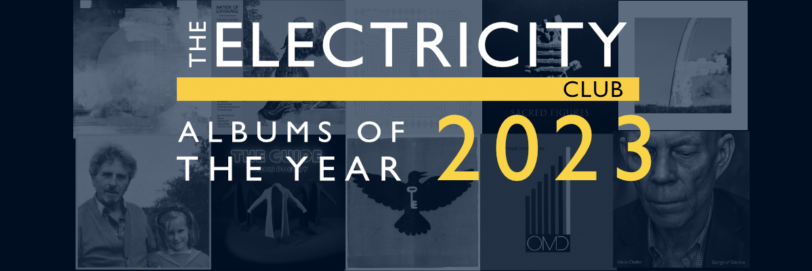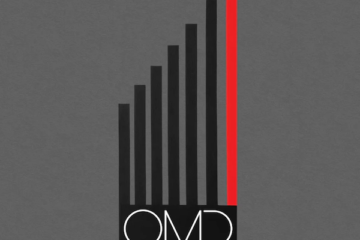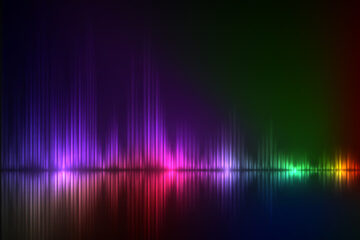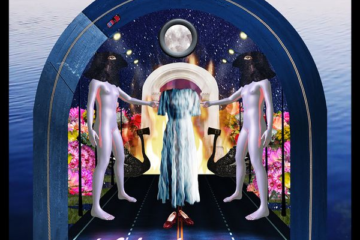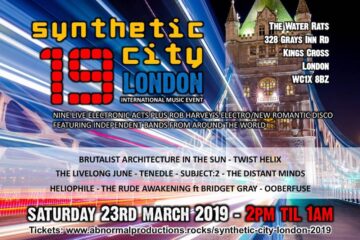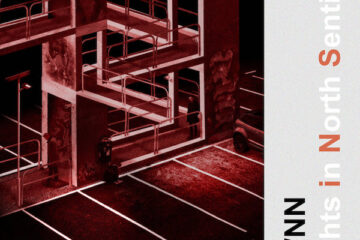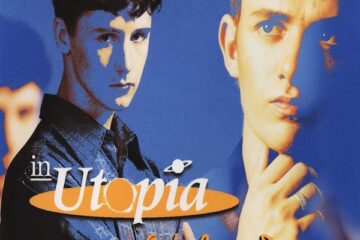TEC’s Albums of Choice from 2023…
2023 proved to be a busy year for music which saw some legacy acts making an impressive return with some standout albums, while plenty of contemporary synth-pop outfits also delivered some strong contenders.
Here are a selection of albums that are not presented in any particular order (aside from our top choice), but as a whole were the standout long-players for The Electricity Club in 2023.
~ ALBUM OF THE YEAR ~
OMD – Bauhaus Staircase
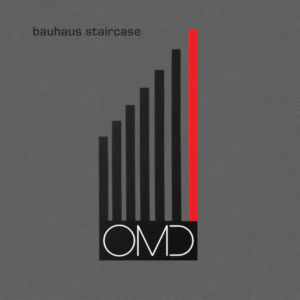
With such an impressive musical history, it must have been daunting for OMD to conjure up a new studio album that respected that legacy while also managing to craft something that can stand proud in the modern music scene. Fortunately, Bauhaus Staircase manages to straddle that tricky balance care of a collection of engaging compositions.
One of the album’s chief strengths is its emotive approach. There’s an intimacy at work here typified by songs such as the elegiac ‘Look at You Now’, the gothic ‘Where We Started’ and the angsty ‘Healing’. But those softer moments are also balanced out by the unashamedly zippy title track, the anthemic ‘Kleptocracy’ and the more weighter elements of ‘Anthropocene’ and ‘Evolution of Species’.
Bauhaus Staircase is being presented as OMD’s possible last album, but if so, it’s definitely an accomplished body of work to end on.
Album Review: Bauhaus Staircase
NATION OF LANGUAGE – Strange Disciple
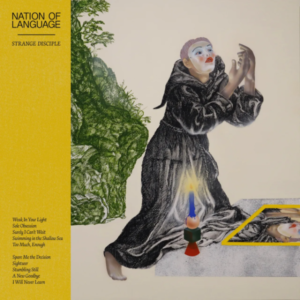
Nation of Language have emerged as one of the perfect synth-pop successors of the modern era, a journey that started with their impressive 2020 debut Introduction, Presence. New release Strange Disciple marks the band’s third album and demonstrates that they’re yet to run out of steam.
Thematically, the album pulls inspiration from unhealthy infatuations, including overzealous fans. Yet, there’s a lightness of touch present on tracks such as ‘Sole Obsession’, ‘Stumbling Still’ and ‘Sightseer’ with Ian Devaney’s vocals taking on a dreampop sensibility. But the songs still have a groove lurking in their heart with some deft bass lines and a warm synth pallette.
Strange Disciple also pulls in some surprises, including the shimmering washes of ‘Swimming in the Shallow Sea’ and The sepulchral ‘Weak In Your Light’. There’s nods to classic synth-pop too, such as ‘Too Much, Enough’ which brings to mind early Ultravox in places while there’s hints of New Order lurking on closing track ‘I Will Never Learn’.
VINCE CLARKE – Songs of Silence
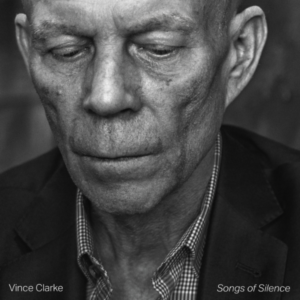
Perhaps one of the year’s most surprising releases came from Vince Clarke. His solo effort Songs of Silence was born from a desire to expand his technical abilities through mastering modular synthesisers. The end result was an album that tackled a sense of mood and downbeat introspection, which Clarke addressed as “having a sense of sadness, of things going bad, things crumbling”.
Tracks such as the cosmic ‘Cathedral’ and ‘Passage’ play around with an ethereal ambience. There’s a more tangible quality on ‘Imminent’, which seems to exude an underlying tonal darkness. Elsewhere, the album steps up a gear with the more frenetic ‘White Rabbit’ and the burbling, insistent ‘Mitosis’.
There’s a starker aspect to ‘The Lamentations of Jeremiah’ which is enhanced by the inclusion of a mournful cello, giving off a prevading sense of gloom and uncertainty. On the haunting ‘Blackleg’, Clarke simply drops in a recording of an 1844 anti-scab song (actually gifted to Clarke some years previously by Martyn Ware). The words seem to fade in and out against Clarke’s drone-like atmosphere, lending this track an eerie quality that’s a little unsettling.
Songs of Silence is not always a comfortable listening experience, yet despite the darker aspects of the album there’s also a sense of optimism lurking in the depths.
LADYTRON – Time’s Arrow
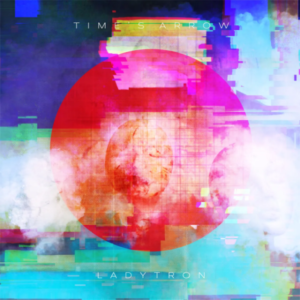
Ladytron’s evolution into baroque pop perfectionists is clearly felt on latest release Time’s Arrow. Opening number ‘City of Angels’ has that familiar brooding quality, yet coupled with a pop breeziness. The shimmering ‘Faces’ treads similar territory with its effusive electronic drive. Then there’s ‘Misery Remember Me’, a soaring delight offset with some tumbling percussive effects.
There’s a more organic, earthy quality on ‘The Night’ which employs some wonderfully intense and off-kilter vocal melodies. It’s perhaps indicative of more classic Ladytron moments with a strangely unsettling mood, enhanced by what sounds like detuned synths. Similarly, ‘Sargasso Sea’ is an oddly disconcerting composition which is built up of layers of brooding synths and hazy, indistinct vocal fills.
There’s a travelogue aspect to Time’s Arrow, which darts around geographically and perhaps reflects the fact that Ladytron’s members are globally spread apart. Themes of cultural collapse and the curious nature of time wrap themselves up on a series of exquisite electronic compositions. It’s an album that offers up an older, definitely wiser incarnation of Ladytron.
SIGUR RÓS – Átta

Sigur Rós’ first new studio album in ten years, Átta was billed as “their most intimate and emotionally direct record to date”. It’s not an unfair assessment with a series of warm, mesmerising compositions that brings to mind classic Sigur Rós.
Much of the album’s sound is also enhanced with orchestral arrangements courtesy of the London Contemporary Orchestra conducted by Robert Ames, alongside brass performed by longtime Icelandic collaborators Brassgat í bala. Átta (Icelandic for ‘8’) is also the band’s first album since 2012’s Valtari to feature keyboardist Kjartan Sveinsson, who rejoined the band in 2022.
As ever, Jónsi’s gossamer vocals lends the compositions here an evocative, melancholic beauty.
SLOWDIVE- Everything Is Alive
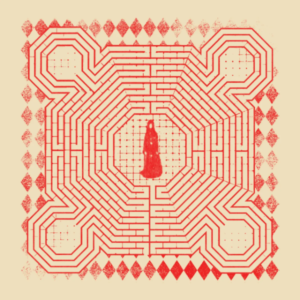
It seems strange to feature shoegaze pioneers Slowdive on The Electricity Club, although the reformed outfit do have previous form with dabbling in electronic music. Take 1995 album Pygmalion which played around with minimalist electronica and looping. At times, there’s a sense that Everything Is Alive is throwing a nod to that earlier album and in fact its genesis arose from material that Neil Halstead had conjured up on modular synthesizers in 2019 for a planned solo record.
Opener ‘Shanty’ seems to be a perfect balance between that electronic approach combined with guitar washes to present a dreamlike soundscape. ‘Prayer Remembered’ opts for a more sober approach with its doleful moods. Elsewhere, ‘Andalucia Plays’ seems to be striking out for a mashup between atmospheric electronics and Mojave 3’s folksy vocal approach.
The evocative ‘Kisses’, meanwhile, taps into a more classic Slowdive approach with its shimmering guitars and gauzy vocals. Equally, ‘Skin In The Game’ touches on Slowdive’s talent for conjuring up captivating ambient moments via distorted, washed-out guitar. But the breezy ‘alife’ marks out one of the album’s true highlights with its gauzy dreampop approach.
Album Review: Everything Is Alive
BATTERY OPERATED ORCHESTRA – Compulsory Games

Battery Operated Orchestra show a clear love of analogue synths, often combined with a raw, garage-electro quality.
Compulsory Games represents the duo’s fifth album (following on from 2020’s Yesterday Tomorrow and You) and is described as an album that “explores our complicity with power and throws a wry smile at the games we’re forced to play every day.”
There’s the angular electropop of ‘Service Economy’, offering up some blunt commentary on the daily grind of working in the service industry and the problems it presents (“I’m just making money/Not your accessory”). Meanwhile, ‘Nightclub Mishap’ is a gloriously neon-charged slice of indie synth-pop. The easy going ‘Unbecoming’ offers one of the album’s understated gems. Some mesmerising vocal melodies resonate on this number with the bell-like synth rhythms beating in sympathy.
Equally, the album’s title track is a warmer affair that evokes a classic BOO sound as Casio pop elements battle with emotive synth melodies. Compulsory Games also has a few charming instrumental interludes: ‘Rainhead’ offers up a synth ASMR moment with its contemplative tones while album closer ‘All That Rises Must Converge’ is a wistful analogue delight; a repeating beacon of a simple melody covered in washes of echo.
STEVEN JONES & LOGAN SKY – Sacred Figures
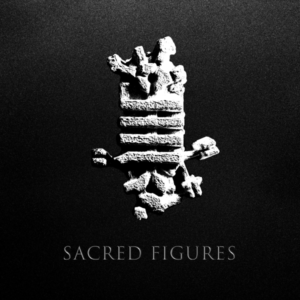
Sacred Figures represents the sixth album from Steven Jones and Logan Sky, a collection of songs that touch on ideas about faith, belief and the concept of veneration. One of the album’s strengths is its ability to bounce between melancholia and a more uplifting essence. That chemistry serves up the sweeping glory of ‘Dharma Wanderers’, the hymnal ‘Thalia’s Room’ and the blocky rhythms and introspective musings of ‘Into Dust’ (which suggests early The The).
Then there’s the lush beauty of ‘This Silence, Our Tragedy’, a track which seems reminiscent of Roxy Music in places; a stylish, lounge pop offering with smooth synth elements augmented by some sweet sax flourishes. By contrast, the album’s title track is hewn from a more classic coldwave template; brooding synths wash in and out with some minimalist percussion. The stark spoken word delivery renders lines such as “Sacred figures, you don’t speak to me when I pray” with a strangely affecting power.
This latest offering from Jones and Sky is not an album that elicits easy categorisation, easily slipping past tags such as synth-pop or dark wave. Instead, Sacred Figures is a haunting, intriguing electronic journey that also asks deeper questions about the human condition.
SUSANNE SUNDFØR – Blómi
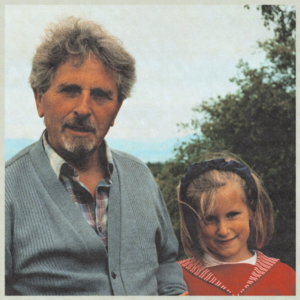
Norwegian singer-songwriter Susanne Sundfør has delivered some stunning work previously and Blómi, marking her sixth studio album, continues that trend. For those that embraced 2015’s electronic masterpiece Ten Love Songs, there might feel less enthuisiasm for Sundfør’s desire here to lean more into a folk tradition. But Blómi (which means ‘To Bloom’) offers up a haunting album that delves into beauty and introspection in equal measure.
The ethereal moods of ‘Ashera’s Song’ with its gentle piano melodies can’t fail to charm. Similarly, piano dominates the melancholic ‘Náttsǫngr’. Elsewhere, the simple acoustic guitar-driven ‘Rūnā’ switches up into a spiraling, almost anthemic number. Then there’s ‘Leikara Ljóð’, which employs a mixture of natural sounds, hand percussion and some effective vocal melodies.
The album’s highlight, however, is the hymnal ‘Alyosha’; a joyous, uplifiting number built from easy piano and guitar fills. The lyrics are pointedly a reaction against a modern day sense of pessimism and lack of empathy (“Love has died and all is worthless/But that is not what I believe in”).
Sundfør seems determined to strip down her approach album by album, leaving much of the electronic elements of Blómi to paint more of a subtle backdrop for her engaging lyrical narratives. But this doesn’t rob her latest album of its heartfelt power.
VOGON POETRY – The Guide
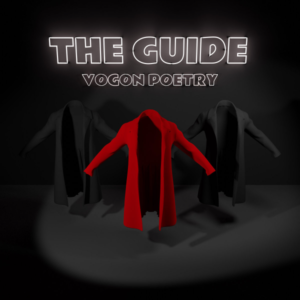
Following on from 2020’s excellent Deep Thought (see TEC review previously), The Guide represents Vogon Poetry’s fifth album release (The band have also collaborated with fellow Swedes Social Ambitions on select tracks).
One of the album’s gems is opening track ‘Rocinate’, inspired by sci-fi TV show The Expanse. Setting aside their upfront synth-pop banger style, here Vogon Poetry instead opt for a more minimalist approach. The end result is a more subtle, brooding affair which combines perfectly with dialogue samples from the TV show. Another winning moment comes via ‘Atomic Skies’ (see TEC review previously) which shows off Vogon Poetry at their best: bold and engaging pop with driving, percussive elements. The catchy melodies and John Anderson’s distinctive Swedish burr make this a song that will be rattling around in your head for hours afterwards.
There’s other fine moments, such as the euphoric ‘Gargle Blaster’ but the album also serves up moodier moments, such as ‘The Forbidden Land’ and ‘Colours’.
Vogon Poetry’s approach is certainly unusual, but their sum talents elevate them above what could simply be a novelty act. They have an experienced hand when it comes to composition and arrangement and know how to pen catchy synth-pop (and also with a sly wink at the same time).
Honourable Mentions
DEPECHE MODE – Memento Mori, MAGNETIC SKIES – Empire Falling, CULT WITH NO NAME – X into I, SCENIUS – Life Is A Thing. DEAD LIGHTS – Glitterspit.
The Blitzed Effect
“Culture is the antidote to propaganda” Vivienne Westwood
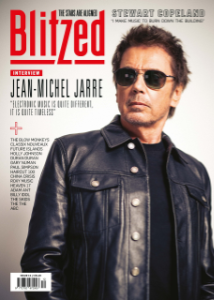
This year also saw the expansion of music and culture magazine Blitzed. That publication recruited the talents of the Electricity Club team, among others, to provide reviews, interviews and features across the year.
Blitzed was conceived as a celebration of the music and culture that revolved around legendary 1980s London venue, the Blitz Club. That venue was the focal point that birthed the New Romantic scene and led to an artistic explosion in the worlds of music, fashion and culture. At the same time, Blitzed is a publication that acknowledges that the legacy of that period has evolved into the contemporary culture of today. As a result, Blitzed celebrates the modern era’s musical and cultural talents that the Blitz Era inspired.
Blitzed has featured interviews with the likes of OMD, Marc Almond, Jean-Michel Jarre, Wolfgang Flür, Martyn Ware (Heaven 17, Human League), Midge Ure, Toyah, Ladytron, China Crisis, Altered Images, Howard Jones, Neil Arthur (Blancmange), Rusty Egan (musician and Blitz Club co-founder), Steve Strange (musician and Blitz Club co-founder) and xPropaganda among others. Blitzed has also celebrated anniversaries for many of the classic albums of the 1980s with feature articles covering acts such as Depeche Mode, Yazoo, Duran Duran, Gary Numan, Soft Cell, The The, David Bowie, Culture Club and much, much more. Plus the usual news, reviews, gig reports and regular columns.
You can check out the magazine in either digital or print format here: https://blitzedmag.com/shop/


